Author(s) |
Title and Abstract |
Qian, H- Y., & Walker, A.
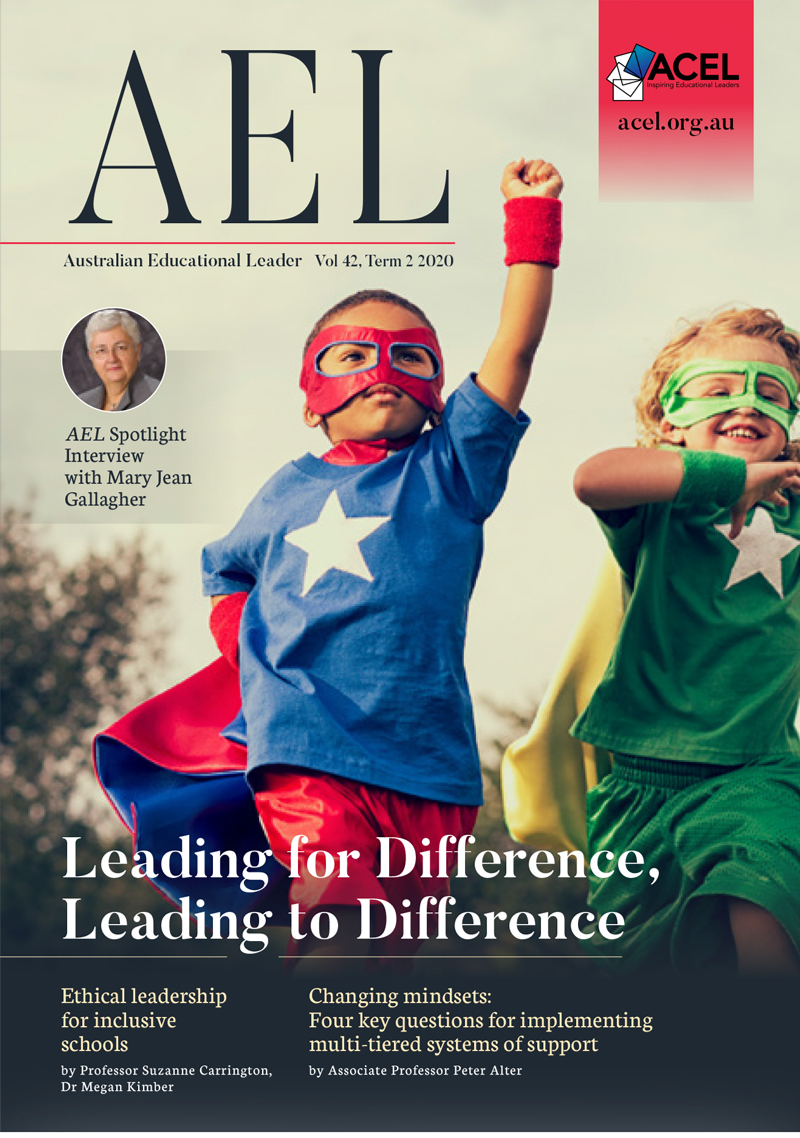
|
Expert teachers as drivers of teacher professional learning. Australian Educational Leader. 42(2), 29-32.
Abstract:
Is Australia leveraging the talent of its best teachers? What are the transformations that could flow if its best teachers are able to spread their wisdom across more and more classrooms? This article reports on China as an example and how it relies on "expert" teachers to drive effective teacher learning as well as briefly discusses some implications for Australia.
|
Chen, J., Yin, H.,
& Frenzel, A. C.
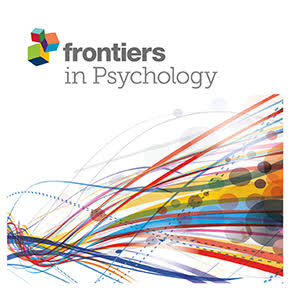
|
Teacher emotion matters: Nature, antecedents, and effects. Frontiers in Psychology (Educational Psychology). doi: 10.3389/fpsyg.2020.605389.
Abstract:
Along with increasing recognition of the varied aspects of education, research on teacher emotions has blossomed recently after being unacknowledged for decades. The statistics from Scopus indicate that the number of journal articles published on teacher emotions in the past 5 years is 497, comprising the largest proportion (61%) of the 812 total article corpus on the topic over the past 35 years1. Despite this notable growth, the field is still in a pre-mature developmental stage as it lacks a full consideration of the complexities of teacher emotions, and a balanced coverage of research foci and methodologies (Frenzel, 2014; Fried et al., 2015; Chen, 2019, 2020; Yin et al., 2019). In particular, Fried et al. (2015) have argued that “the study of teacher emotion is in need of conceptual clarity” (p. 415). Likewise, Chen (2019) identified a clear need for advancing mixed-method and longitudinal studies on the topic as the existing literature on teacher emotions largely relies on self-report data and cross-sectional research designs. Although interest in the field has been growing since the first special issue by Nias (1996) in the Cambridge Journal of Education, teacher emotions have previously been addressed in only one single virtual special issue which focused on articles published in Teaching and Teacher Education by Uitto et al. (2015). The present Research Topic in Frontiers in Psychology thus aims to provide a platform for showcasing the latest research on teacher emotions, to acknowledge its increasingly important scientific impact. Inspired by the reciprocal model of teacher emotions proposed by Frenzel (2014), the current Research Topic is entitled “Teacher Emotions Matter: Nature, Antecedents, and Effects.” It was designed to spark the publication of new empirical evidence about potential reciprocal linkages between teacher emotions and other constructs, and thus contribute to the conceptual framework within the teacher emotion literature. Furthermore, this Research Topic sought to embrace a corpus of robust research covering various research foci and innovative methodologies, aiming at maturing the evolving conceptual understanding of teacher emotions. The 16 papers which comprise this Research Topic in many ways achieve this claim, even though again, there is a predominance of cross-sectional designs and self-report-based methods of inquiry. The collection of papers consists of two parts. Part 1 explicitly covers teachers' emotional and affective experiences, with papers one through four addressing the nature of teacher emotions, papers five through seven focusing on antecedents, papers eight and nine focusing on effects, and papers 10 and 11 focusing on reciprocal linkages. Part 2 addresses teachers' emotion regulation and emotional competence (papers 12 through 16).
|
Chen, J.
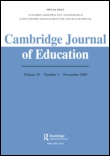
|
Refining the teacher emotion model: Evidence from a review of literature published between 1985 and 2019. Cambridge Journal of Education.. https://doi.org/10.1080/0305764X.2020.1831440.
Abstract:
This review study aims at providing a fine-grained picture of the research from 1985 to 2019 on teacher emotions. A narrative approach was adopted to undertake the review of 812 articles. The method was constructed under the guidelines of the Preferred Reporting Items for Systematic Review and Meta-Analysis. Based on evidence drawn from existing models and the literature, this review constructed a refined Teacher Emotion Model. This Teacher Emotion Model represents a dynamic, interrelated relation among different elements with one-way, reciprocal and correlative relations between antecedents, teacher emotions and consequences. Implications with regard to theory and foci for future research are then discussed.
Keywords: Teacher Emotion, Mood, Feeling, Narraitve, Review
|
Lu, J., &
Campbell, P.
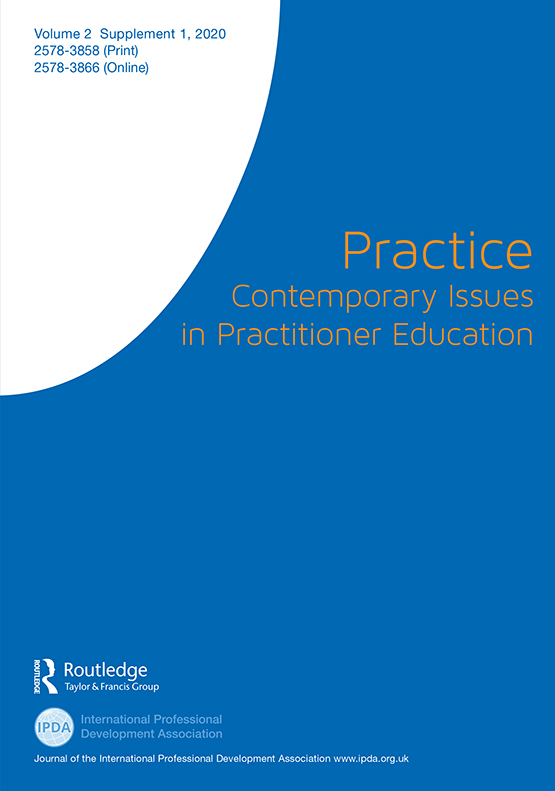
|
Conceptualizing innovation and professional learning in the Hong Kong context. Practice: Contemporary Issues in Practitioner Education. https://doi.org/10.1080/25783858.2020.1831887.
Abstract:
In this paper, we review the challenges of sustaining effective teacher professional learning in Hong Kong and propose that professional learning could enable teacher innovation, and teacher innovation reversely rejuvenates professional learning. We also argue that greater exploration is needed of how professional learning is theorised in relation to broader themes that influence it. These key themes explored have significant implications for both organisational and wider systemic culture and practice both in Hong Kong and in systems around the world.
Keywords: Professional Learning, Innovation, Leadership, Change, System
|
Nichols, N.,
& Tang, H. H. H.
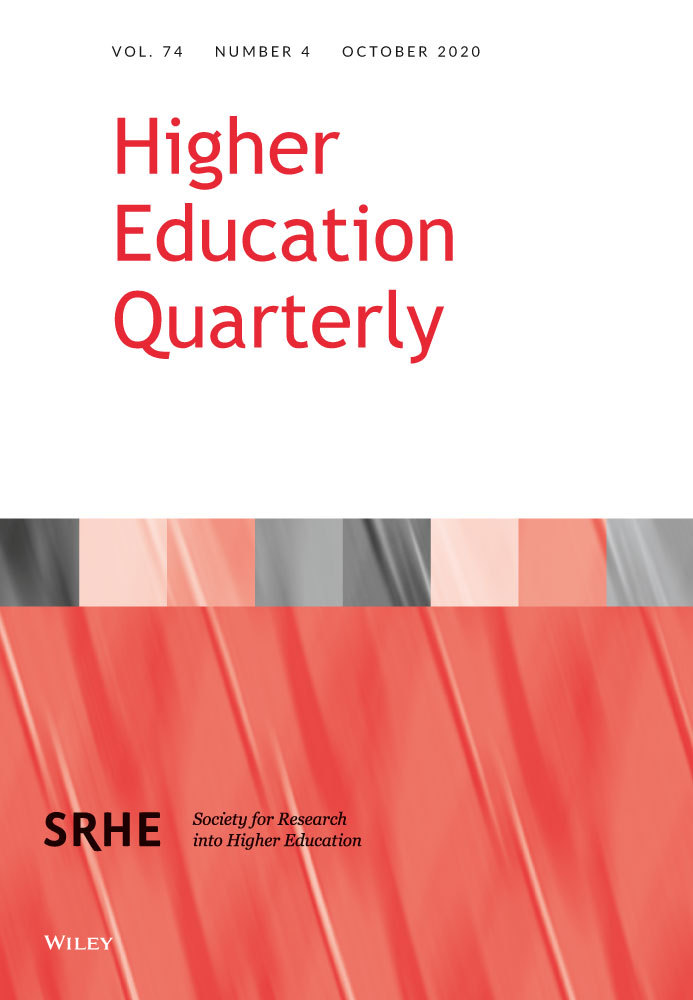
|
Navigating managerial and entrepreneurial reforms in research‐intensive universities: A comparison of early career trajectories in Hong Kong and Canada. Higher Education Quarterly, Early View.
Abstract:
This article conveys the results of a reflexive investigation of the managerial practices and entrepreneurial discourses that shape the academic trajectories of early career scholars. Beginning with the experiences of early career scholars in research‐intensive universities in Canada and Hong Kong, the authors explore some of the social and political‐economic relations that are reshaping higher education systems across the world. Drawing on experiences navigating university governance, funding and performance management processes, the authors explore how participation in the marketised relations of higher education inserts people into competition with colleagues within and beyond a single university context, instrumentalises and constrains relationships with civil sector collaborators, and produces a shared sense that nothing one does is ever enough. In this way, the article illuminates some of the ways a new global knowledge economy conditions academic life.
|
Yang, X.,
Hua, R.,
Zheng, M.

|
The Shanghai model: An innovative approach to promote teacher professional development through teaching-research system. Educational Philosophy and Theory, https://doi.org/10.1080/00131857.2020.1794155
Abstract:
Chinese students’ outstanding performance in several rounds of PISA tests has attracted extensive attention on Chinese teacher professional development practices and system. The school-based teaching research system has evolved for many years in China and became a mature and systematical model for improving teaching quality. However, this system and its functions has not been fully recognized and understood. This case study, mainly focusing on Shanghai, explores how the teaching-research system formed and developed and how it influenced teachers’ learning and professional development. We summarized three different versions of Shanghai’ teaching-research models and deeply described their processes, characteristics, and influence. Future research directions and implication for creating an effective and sustained approach for improving teacher quality were also discussed.
Keywords: Teacher Professional Development, Shanghai, Teaching-research System, Teaching Quality |
Liu, C.,
Chung, K. K. H., Wang, L. C.,
& Liu D.
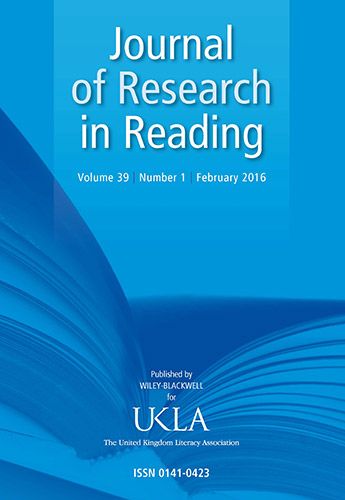
|
The relationship between paired associate learning and Chinese word reading in kindergarten children. Journal of Research in Reading.
https://doi.org/10.1111/1467-9817.12333.
Abstract:
Background Research has shown that paired associate learning (PAL) plays an important role in children's word reading across different languages. However, little is known about the construct of PAL and its relationship with word reading in Chinese children.
Methods A total of 204 second‐year kindergarten children from Mainland China were assessed on measures of PAL, including the four mapping conditions of PAL: visual–verbal, verbal–verbal, visual–visual and verbal–visual PAL. Tasks of working memory (WM), inhibitory control, visual‐motor integration (VMI), phonological awareness, orthographic knowledge and Chinese word reading were also administered to these children.
Results Our results showed that WM, VMI and phonological awareness were unique predictors of PAL, whereas inhibitory control and orthographic knowledge were not. Furthermore, PAL showed an independent contribution to Chinese word reading after controlling for phonological awareness and orthographic knowledge. The mediation analysis showed that PAL was a significant mediator of the association between different cognitive‐linguistic skills and Chinese word reading.
Conclusion Paired associate learning contributes to Chinese word reading over and above phonological awareness and orthographic knowledge. Findings underscore the potential importance of PAL, as distinct from other cognitive‐linguistic skills, for understanding variability in early reading development.
|
Tang, H. H. H.
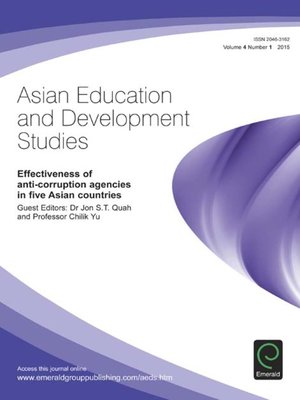 |
The strategic role of world-class universities and academic profession in regional innovation system: China’s Greater Bay Area and Hong Kong's academic profession. Asian Education and Development Studies, online first.
Abstract:
Purpose – This paper aims to examine the strategic role of world-class universities and the international academic profession in the regionalisation project of China’s Greater Bay Area (GBA). It illustrates the way in which the case of the GBA regionalisation project offers a potentially rich empirical example for adding contextual understanding to the literature of the Triple Helix model, which largely draws on inductive theorising from western successful innovation cases. The GBA regionalisation processes will provide a wealth of empirical cases for identifying circumstances that address tensions and increase interactions in the Triple Helix relationship of university, government and industry for fostering knowledge synergies.
Design/methodology/approach – Focusing on the case of Hong Kong, it engages in policy and stakeholder analysis and addresses three key research questions: What are the competitive advantages and potential strategic role of Hong Kong’s universities and academic profession in the regionalisation of innovation systems in the GBA? What is the role of the governments in the regionalisation processes? What are the expected opportunities and challenges offered by the GBA policy initiatives for the future development of Hong Kong’s universities and academic profession?
Findings – Hong Kong, given its status as an international finance centre and global city with intense internationalisation and established judicial system operated by the rule of law, will contribute to the GBA development by leveraging on its edge in scientific research and development and international networks of academic research through the world-class academic profession. Scientists and researchers in the city, possessing the competitive advantages of basic research and international partnerships, are highly regarded by the central government. The engagement of Hong Kong’s scientific talents, can play an important role in achieving China’s aspiration of becoming a global technology power.
Research limitations/implications – Analysis of this article implies that the GBA concept is currently China’s ambitious but vague economic plan. The opportunities in which key node cities and knowledge/ innovation clusters will capture and capitalise from the regional ‘co-opetitive” ’entrepreneurial ecosystem are still unclear. The future of the GBA regionalisation is so dynamic and open-ended that grounded concepts related to the governance innovation/ discourse of ‘one country two systems’ and social connectedness and capitalisation with Chinese characteristics will help in making sense of the contextualisation of a Chinese regional innovation system and enhancing the sophistication of reconceptualisation of the Triple Helix model.
Originality/value – This article will add to the literature some novel contextualised knowledge about the GBA’s potential triple-helix relationship between government-university-industry in the 21st century. The empirical example of China’s GBA will also shed light on a new understanding of the role of international social capital in the entrepreneurial knowledge economy, dynamics between basic and applied research, and a synergistic interface between regionalisation and national innovation system. Keywords Hong Kong, Triple helix, Academic profession, China’s greater bay area, Regional innovation system, World-class universities
Paper type General review
|
Wang, M., Ho, D., Lu, J., & Yang, D.
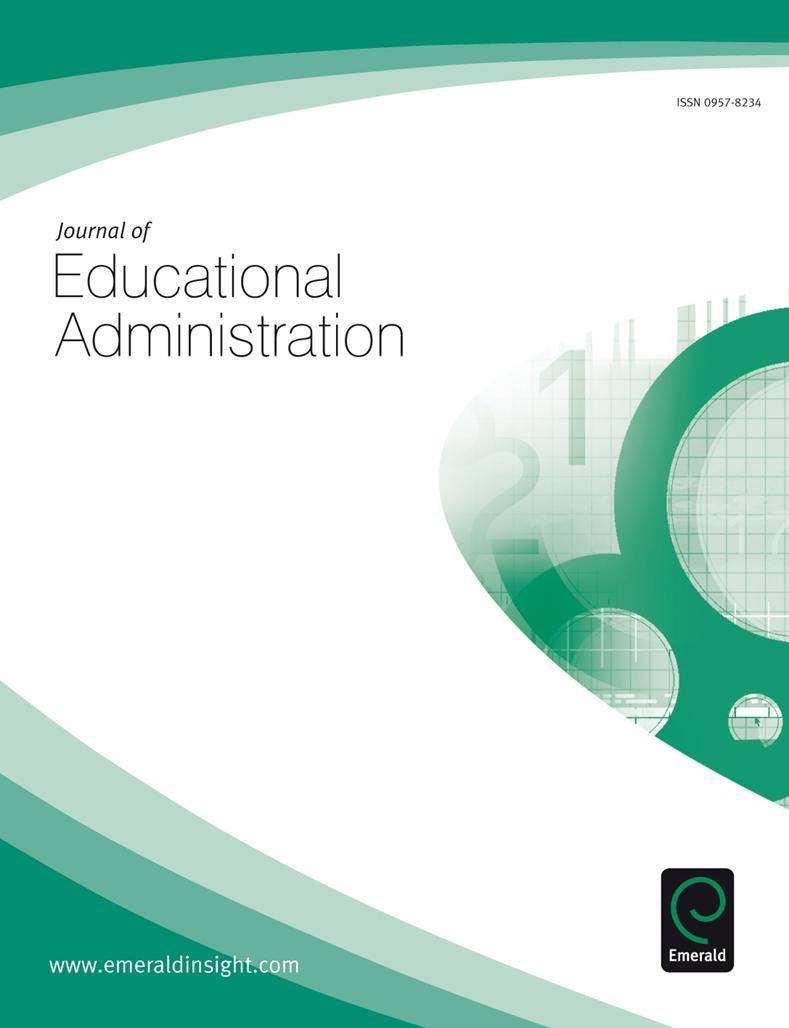 |
Constructing early childhood leadership models in China: A mixed-methods study. Journal of Educational Administration. https://doi.org/10.1108/JEA-09-2019-0149.
Abstract:
Purpose. The purpose of this study is to construct a scale that is contextually suitable for measuring early childhood leadership in China.
Design/methodology/approach. Following a standard scale development procedure, both qualitative and quantitative research approaches were addressed. Qualitative data was collected from 21 semistructured interviews with formal and informal teacher leaders in Xiamen City, China. Using survey data of 120 respondents and 305 respondents, an exploratory factor analysis was conducted twice to determine the underlying factorial structure of the scale. A further sample of 317 respondents were used to test the latent structure and validity of the scale using confirmatory factor analysis.
Findings. Based on the results from reliability and validity tests, this study indicates that the scale demonstrates sound psychometric properties. A three-factor model was determined, including staff management and development, peer learning and support and communication with parents.
Originality/value. This The scale is the first of its kind for measuring early childhood leadership in China.
Keywords: Early Childhood Leadership, Staff Management anbd Development, Peer Learning and Support, Communication with Parents, China
|
Szeto, E.
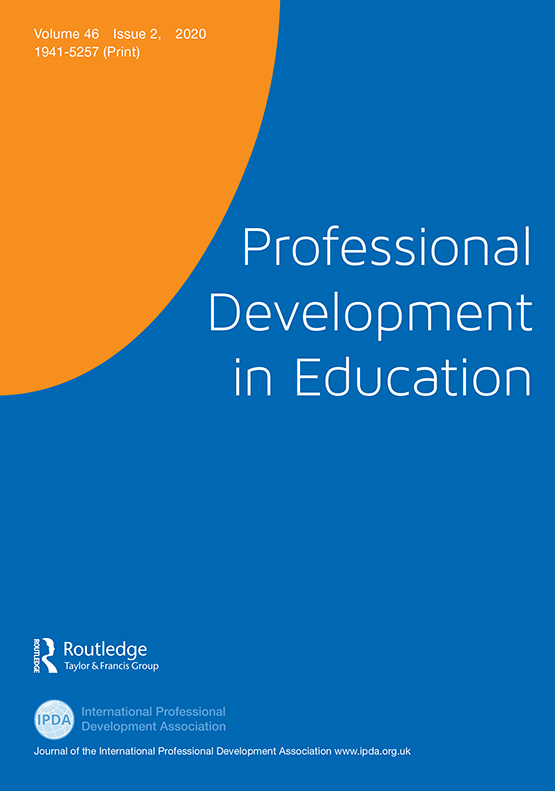
|
Influence of professional cultures and principal leadership effects on early-career teacher leadership development in Hong Kong schools. Professional Development in Education. doi: 10.1080/19415257.2020.1770837.
https://www.tandfonline.com/doi/full/10.1080/19415257.2020.1770837
Abstract:
This paper aims to extend our understanding of the influence of school professional cultures and principal leadership effects on early-career teacher leadership aspiration, learning and development in the evolving hybrid of Western and Confucian cultures of Hong Kong. What are early-career teachers’ aspirations of leadership development in different professional cultures of the school? How do the principal leadership effects facilitate or hinder teacher leadership development in the professional culture? A multiple case study approach was adopted. Findings show that positive professional culture built by professional relationships between the principals and teachers and among teachers can stimulate early-career teacher leadership aspiration. The principal leadership effects can facilitate and hinder professional collaboration and support for the teacher leadership development in the Chinese school hierarchy of Hong Kong. This study contributes to unveiling in-depth understandings of teacher leadership aspiration, learning and development as the socially constructed experiences of the teachers in contrast to the professional culture highlighted in the school document. Insights gained from the study can inform the in-school progression of teacher leadership development in the school hierarchy. Implications for school achievement through continuing professional development are also highlighted.
Keywords: Early-career Teachers, Figured and Socially Constructed Cultures, Principal Leadership Effects, School Professional Cultures, Teacher Leadership Development. |
Chen, J.
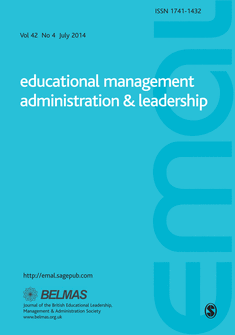
|
Understanding teacher leaders’ behaviors: Development and Validation of a Teacher Leadership Inventory. Educational Management, Administration & Leadership. https://doi.org/10.1177/1741143220945704.
Abstract:
The current paper aims at developing and validating a Teacher Leadership Inventory (TLI). Adopting the theoretical-empirical strategy of instrument development, the procedure consisted of taking a sample of panel experts and undertaking six sequential empirical studies with sufficient samples of teacher leaders from China. After verifying content validity, structural validity, criterion validity, and cross-validity, a 25-item multi-dimensional model on teacher leadership behaviours with five factors was identified. The resulting TLI could provide a validated instrument for future research investigating the nature of teacher leadership behaviours as an independent construct and their relations with other relevant constructs. It is expected that the TLI could serve as a more robust means for promoting the research and practice of teacher leadership.
Keywords: Teacher leader, Mixed Method, Instrument Development and Validation, Teacher Leader Instrument
|
Ho, C. S. M.,
& Lee, D. H. L.

|
Integrating positive financial attitudes to nurture students’ identity as informed financial decision-makers in high power distance Chinese contexts. Journal of Educational Change. https://link.springer.com/article/10.1007/s10833-020-09396-x.
Abstract:
Research on financial literacy has focused on the influence of teachers and parents in financial literacy education, which mediates the impact on students’ financial behaviour. Much less attention has been given to the influence of traditional Chinese hierarchical culture on a child’s identity as a student. This paper applies Lee’s (2017) theory of identity grafting to examine how student self-identity towards personal financial management is reflected in their financial behaviour, and whether nurturing students with positive financial attitudes can improve the financial behaviour of students who are challenged by power distance values. We surveyed 1164 students from 39 secondary schools. We first focus on the influence of power distance on students that endorse the traditional Chinese values that superiors and subordinates should know their place and behave accordingly. Second, we focus on how students’ positive financial attitude interact with power distance effects. The results from structural equation modelling show that that high endorsement of power distance has a negative impact on financial behaviour in spending and that positive financial attitude has a positive influence on financial behaviour in spending, protection and planning. Further, students who highly endorse power distance values but have positive financial attitudes can still demonstrate positive financial behaviour. This paper is the first to validate identity grafting effects on students via statistical study. The implications of the findings on identity grafting are discussed.
|
Szeto, E.
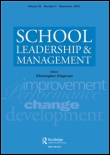
|
School leadership in the reforms of Hong Kong education system: Insights into school-based development in policy borrowing and indigenizing. School Leadership and Management, 40(4), 266-287. https://doi.org/10.1080/13632434.2019.1616172
Abstract:
The current study aimed to investigate excellent teachers’ emotional journey, particularly, the trajectory of emotional experiences and emotional labor strategies at different career phases. The research used a case-study approach to explore the storied experience of two teachers (female and male) who were bestowed the Provincial Excellent Teacher Award. They were close to retirement so they could retrieve emotional experiences from across their entire career. Individual semi-structured interviews were utilized as a major data source, supplemented with relevant documentation and phone calls to achieve data triangulation. Thematic analysis was adopted to deal with data. The findings demonstrated a dynamic pattern of emotions and emotional labor, transiting from one teacher career stage to another. It was observed that the female teacher experienced mixed emotions but the male teacher had more negative emotions at the early stage. Both teachers claimed more positive emotions in the middle stage and a high level of satisfaction in the late stage. Both of them employed genuine expression and surface acting strategies in the first two stages. In the late stage, the female teacher used a combination of genuine expression and deep acting with more empathy, whilst the male teacher adopted a combination of surface acting and genuine expression aiming for a neutral atmosphere. Social values, organizational demands professional self, and gender are discussed for possibly resulting in these discrepancies.
|
Chen, J.
 |
Emotional trajectory at different career stages: Two excellent teachers’ stories. Frontiers in Psychology. https://doi.org/10.3389/fpsyg.2020.01034
Abstract:
The current paper aims at developing and validating a Teacher Leadership Inventory (TLI). Adopting the theoretical-empirical strategy of instrument development, the procedure consisted of taking a sample of panel experts and undertaking six sequential empirical studies with sufficient samples of teacher leaders from China. After verifying content validity, structural validity, criterion validity, and cross-validity, a 25-item multi-dimensional model on teacher leadership behaviours with five factors was identified. The resulting TLI could provide a validated instrument for future research investigating the nature of teacher leadership behaviours as an independent construct and their relations with other relevant constructs. It is expected that the TLI could serve as a more robust means for promoting the research and practice of teacher leadership.
|
Tang, H. H. H.,
& Chau, C. F. W.
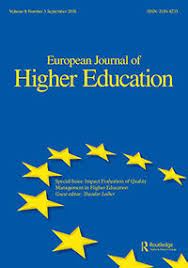
|
Knowledge exchange in a global city: A typology of universities and institutional analysis. European Journal of Higher Education, 10(1), 93-112. https://www.tandfonline.com/doi/abs/10.1080/21568235.2019.1694424?journalCode=rehe20.
Abstract:
In the existing literature of knowledge exchange (KE) and higher education, there is limited but emerging cluster of research which undertakes a comprehensive analysis of various types of higher education institutions and patterns of KE engagement. Employing the empirical example of Hong Kong, this paper examines the interconnections between institutional types and patterns of knowledge exchange (KE) activities in the context of a global city. It found that during the short history of KE policies and activities, all public universities in Hong Kong have been building their capacities for this new intellectual premise in the last decade. Meanwhile, disciplinary comprehensiveness and research/education intensity of the universities affect their institutional responses to the global trend of KE. The typology of higher education institutions suggested by this paper puts forward a perspective to further understand the institutional patterns of KE in the twenty-first century.
Keywords: Institutional Types in Higher Education, Knowledge Transfer, Third Mission, Public Good, Entrepreneurial Universities
|
Chong, K. M. E., Hu, J., Cheng, C. K. E., Davies, I., Tang, H. H. H., Leung, Y. W., & Hung, C. F. S.
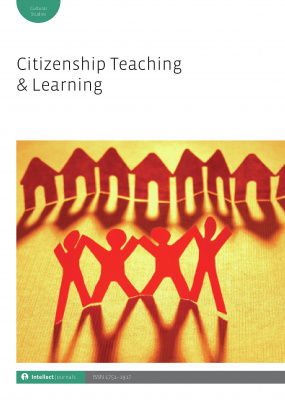
|
Conceptualizing national education and methods of teaching national education in Hong Kong. Citizenship Teaching & Learning.
Abstract:
This paper aims to gain a better understanding of Hong Kong teachers’ perception of national education as implemented in Hong Kong Special Administrative Region (hereafter referred to as Hong Kong SAR) and the interrelationship between their perception and the methods they adopt to teach the topic. We outline the context in Hong Kong relevant to our research and review literature to consider typologies and teaching methods about and for national education. Questionnaire data focusing on the seven typologies of nationalism and the three teaching methods of national education that had been identified in the literature review. 601 questionnaires were returned from 198 schools. The typologies of Cultural Nationalism, Civic and Peripheral Nationalism, Authoritarian Nationalism, Unification Nationalism, and Cosmopolitan Nationalism, and the teaching methods of group discussion and an affective approach characterise the views of Hong Kong secondary school teachers about national education. We suggest that teachers’ diverse views about nationalism and their varied use of teaching methods to achieve their goals suggests the powerful influence of current initiatives from the Chinese mainland and the need to reflect on established academic literature that proposes the decolonisation of the curriculum and interactive and critical teaching methods.
Keywords: National Education, Teacher Perception, Teaching Methods, Hong Kong
|
Lo, W. Y. W.
& Tang, H. H. H.
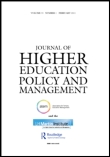
|
Chasing phantoms? Innovation policy, higher education and the pursuit of a knowledge economy in Hong Kong. Journal of Higher Education Policy and Management, 42(2): 178-193. https://doi.org/10.1080/1360080X.2019.1687268.
Abstract:
This paper provides a critical account of the role of universities in the development of innovation and technology in Hong Kong.To do so, the paper examines the political economy of Hong Kong’s innovation and technology development. It outlines a finance-led regime, under which the vision of long-term innovation initiatives is transformed into short-term finance events, and the development of an entrepreneurial culture in society and in universities is neglected. The paper also suggests that the current research funding system and the rise of managerialism in the higher education sector restrict the development of academic entrepreneurship, though universities play a significant role in the innovation system. The paper closes by examining the recent changes in higher education policy and governance, the intensification of integration with mainland China and their implications for prospects of advocating a culture of innovation and promoting innovation and technology in Hong Kong.
Keywords: Innovation Policy, Hong Kong, Finance-led Growth, Academic Entrepreneurship, Managerialism |
Wright, E.,
& Lee, M.
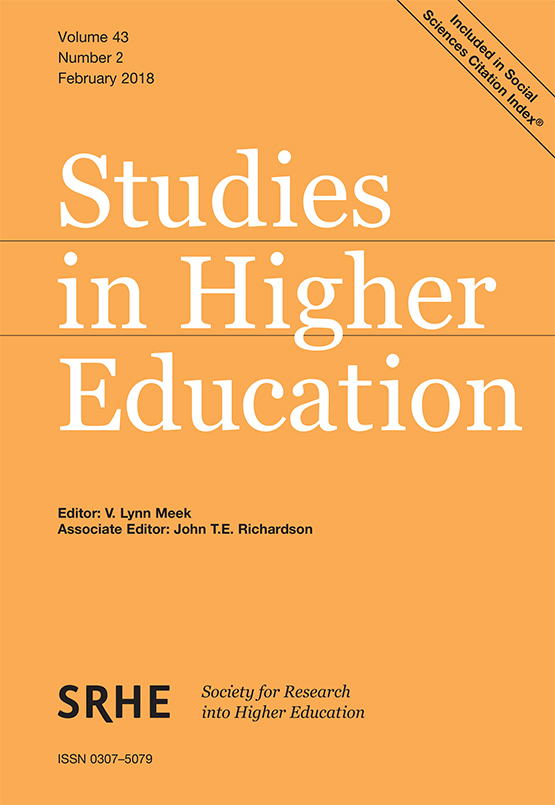
|
Does the International Baccalaureate "work" as an alternative to mainstream schooling? Perceptions of university students in Hong Kong. Studies in Higher Education. https://www.tandfonline.com/doi/full/10.1080/03075079.2020.1793929.
Abstract:
Across East and Southeast Asia, the International Baccalaureate (IB) is expanding and diversifying. More students from affluent families are “opting out” of mainstream schooling to take the IB’s Diploma Programme (DP) in the private sector, which is marketed as a distinctive skill-based education that prepares students for university. This research investigated how DP alumni reflect on their educational experiences in developing cognitive and non-cognitive skills and as preparation for elite universities in Hong Kong. An online undergraduate survey (n=734) found that DP alumni self-perceived higher capacities than non-DP alumni in communication, creativity, critical thinking, cultural sensitivity, global-mindedness, leadership, and time management. In interviews (n=42), DP alumni discussed how their educational experiences “worked” in developing cognitive and non-cognitive skills. However, there were complexities as the DP alumni also perceived that students from mainstream schools were often better prepared for pedagogy and assessments in the context of higher education in Hong Kong.
|
Wright, E.,
& Wei, H
 |
The changing value of higher education as a currency of opportunity. Asian Education and Development Studies. https://www.emerald.com/insight/content/doi/10.1108/AEDS-08-2019-0120/full/pdf .
Abstract:
Purpose. The worldwide expansion of higher education participation has destabilised the value of highereducation as a currency of opportunity. An increasing number of graduates are experiencing the precarity ofunemployment, under-employment and low salaries. This study aimed to investigate how university studentsin China understand and respond to the changing relationship between higher education and careeropportunities.
Design/methodology/approach. The research team conducted 100 in-depth interviews with final-year undergraduates at one elite and one lower-tier university in a metropolitan city in Guangdong Province.
Findings. The students were acutely aware of fierce competition in the graduate labour market. When asked "what matters most" for post-graduation career prospects, they identified elite universities and high-statusfields of study as "traditional" currencies of opportunity. Nonetheless, to stand out in a competitiveenvironment, they perceived a growing need to supplement higher education credentials through universityexperiences (internships, student governance, study abroad programmes), party membership, personalconnections and (overseas) postgraduate education. Moreover, in a "race to the top", they discussed how qualitatively distinctive university experiences and elite postgraduate education are "new" currencies ofopportunity for high-status professional employment.
Originality/value. The study demonstrates how intensified competition for graduate employment canresult in an "opportunity trap". The students were participating in an“arms race”to accumulate positionaladvantages for their post-graduation careers. The net impact of such efforts on a systemic level is to create anupward spiral in what students are expected to do in preparation for their post-graduation careers and furtherdestabilise the value of higher education as a currency of opportunity.
Keywords: Higher Education, Graduate Employment, Positional Competition, Opportunity Trap, China
|
Hong, J.-C.,
Hwang, M.-Y., Szeto, E.,
Tai, K.-H.,
& Tsai, C.-R
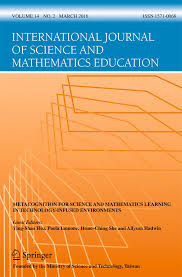
|
Undergraduate science students' scientist–practitioner gap: The role of epistemic curiosity and cognitive flexibility. International Journal of Science and Mathematics Education. https://link.springer.com/article/10.1007/s10763-020-10096-4.
Abstract:
The scientist–practitioner gap refers to the phenomenon of individuals with a scientific background exhibiting non-scientific beliefs. Informed by the social-cognitive process model, this study aimed to develop a more coherent understanding of how such non-scientific beliefs can be predicted by individuals' cognitive flexibility mediated by their epistemic curiosity. A questionnaire was administered to 332 undergraduate students majoring in science at 2 universities in Taiwan. It included items on cognitive flexibility, 2 types of epistemic curiosity, and non-scientific beliefs. After the reliability and validity of the items and constructs were validated, structural equation modeling was applied to verify the research model. Results indicated that the 2 types of epistemic curiosity, interest-type and deprivation-type, were positively predicted by cognitive flexibility but were negatively reflected in the students' non-scientific beliefs. The study also tested the gender difference for each factor and found that female students majoring in science tended to have stronger non-scientific beliefs than their male counterparts. The results imply that if a higher level of cognitive flexibility is attained, the scientist–practitioner gap may be reduced. |
Ho, C. S. M.,
Lu, J., &
Bryant, D. A.
 |
The impact of teacher entrepreneurial behaviour: A timely investigation of an emerging phenomenon. Journal of Educational Administration. https://www.emerald.com/insight/content/doi/10.1108/JEA-08-2019-0140/full/html.
Abstract:
Purpose. This study aims to understand of the role that teacher entrepreneurial behavior plays indeveloping teacher professional capital. The extant concepts around school leadership mostly encompass thetransformative and instructional roles of school leaders in managing, mobilizing and supporting teachers forstudent achievement. However, school leadership has not focused strongly on promoting innovation and risk-taking for schools in a knowledge economy. As a timely promising response to the increasingly demanding andcompetitive school context, teacher entrepreneurial behaviour (TEB), which emphasizes teachers’willingnessto take risks and be daring, has started to gain recognition in the school leadership literature, yet a nuancedunderstanding of TEB’s potential impacts on schools is lacking.
Design/methodology/approach. Based on a combined consideration of institutionalized recognition andexpert judgement, this study identified three innovative entrepreneurial teachers/teacher groups that had wonthe most competitive teaching award in Hong Kong. Employing a multiple-site case study design, this studyconducted semi-structured interviews with 23 informants and collected supplementary school documents andrecords.
Findings. This study found that TEB enables the implementation of innovation and promotes cross-subjectalignment. It cultivates trusting and coherent relationships among teachers. Teachers with TEB scaled upinnovation among other teachers. Furthermore, entrepreneurial teachers enhance school attractiveness bycreating competitive advantages.
Originality/value. This analysis showed that TEB enables formal and informal school leaders to bring forthcritical school outcomes. This study elaborates how TEB enhances teachers’professional capital throughbuilding trusting and coherent relationships. It also adds to the research on school innovation bydemonstrating that TEB fosters teachers’capacity for bottom-up innovation in the community.
Keywords: Teacher Entrepreneurship, Teacher Entrepreneurial Behavior (TEB), Professional Capital, Middleleadership
|
Walker, A.,
& Qian, H-Y.

|
Development a model of instructional leadership in China. Compare: A Journal of Comparative and International Eduction, https://doi.org/10.1080/03057925.2020.1747396 .
Abstract:
This paper explores instructional leadership practices in China. It has three interrelated purposes. The first purpose is to report data which contributes insights into how Chinese principals understand and enact instructional leadership. The second purpose is to examine how the societal context impacts the enactment of leadership and the third is to suggest implications for international understandings of successful school principalship. The study adopted a qualitative approach and interviewed 101 primary school principals across six regions in China. A model of instructional leadership comprising six dimensions and a set of sub-dimensions emerged from the data. The study also provides insights into how societal context shapes how Chinese principals enact leadership. The paper concludes with six propositions that attempt to capture the fluidity and complexity of the working lives of school principals in China.
Keywords: Instructional Leadership, China, Social Context |
Qian, H- Y.,
& Walker, A.

|
Creating conditions for professional learning communities (PLCs) in schools in China: The role of school principals. Professional Development in Education, https://doi.org/10.1080/19415257.2020.1770839 .
Abstract:
School principals play a key role in the creation and nurture of school conditions conducive to Professional Learning Communities (PLCs). In China, whereas the term PLC itself is an imported concept and rarely used by school practitioners, the precept of PLCs, collaborative teacher learning activities, are firmly embedded in teachers’ daily work. However, little research has examined the relationships between principalship and PLCs in the country. This article uses data collected from over 100 primary school principals across six regions in China to explore the role principals play in building and sustaining PLCs in Chinese schools. The article specifically asks what Chinese school principals do to create the structural, cultural and relational conditions needed to foster PLCs. The study identifies some common leadership strategies adopted by Chinese principals and related insights into embedding ongoing professional learning in schools.
Keywords: School Principalship, Professional Learninbg Community, China, School Conditions. |
Wang, X.
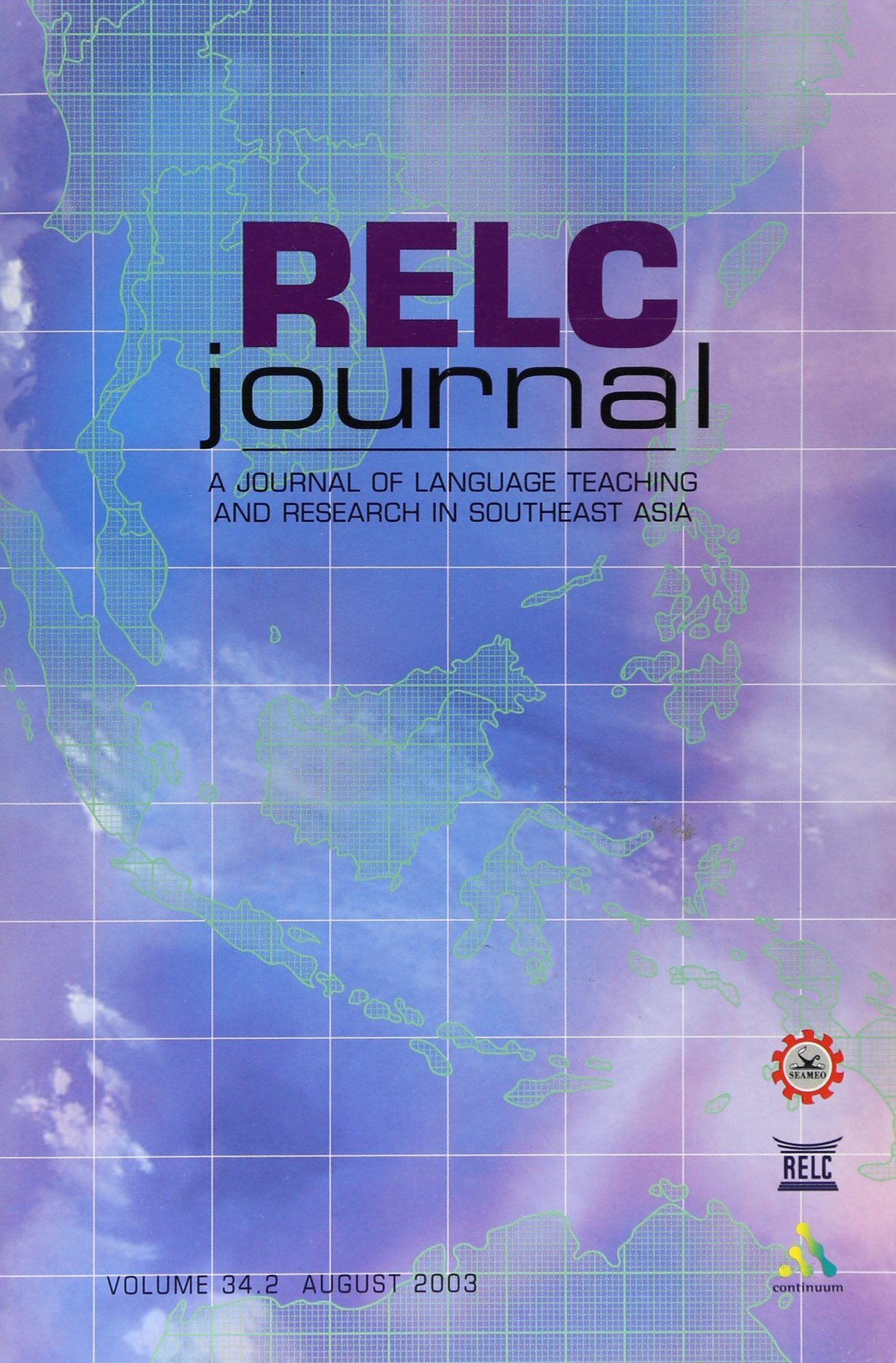
|
Segmental versus suprasegmental: Which is more important to teach? Regional Language Centre Journal. https://doi.org/10.1177/0033688220925926.
Abstract:
This article considers the continuing debate in pronunciation instruction (PI) about whether segmental or suprasegmental features are more important in teaching English to speakers of other languages. While evidence has accumulated on both sides of the debate, the emergence of the notion of English as a Lingua Franca (ELF) further complicates the issue. This article provides a review of current research supporting the different views in the segmental/suprasegmental debate. The review highlights research evidence that examines either the impact of segmental and suprasegmental features on intelligibility or the effectiveness of teaching these features to improve intelligibility. A review of this line of research underlines the context-specific nature of the debate and a third view that blurs the boundary between segmentals and suprasegmentals.
Keywords: Segmental/suprasegmental Features, Pronunciation Instruction, English as a Lingua Franca |
Chan, H.,
& Choi, T.-H.
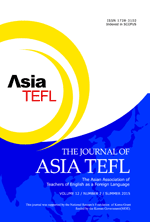
|
Language-in-education policy formation through a consultation-based system: The case of multilingual curricula in Cambodian universities. The Journal of Asia TEFL, 17(2): 463-478.
Abstract:
This paper elucidates the under-researched policy formulation process, using Cambodia as the case context. In the face of ASEAN regionalisation, foreign language education (FLE) in Cambodian universities has become a battlefield of different stakeholders representing varied interests. With languages playing significant roles in economic and political competition among ASEAN countries, scholars (e.g., Andy Kirkpatrick) called for research to investigate the negotiation process of language-in-education policies (LEP). Cambodian FLE in higher education makes a unique case for LEP formation as the process has little prescription on its content except for gaining a consensus among different stakeholders. This study captures the negotiation process, identifying the multiple stakeholders and their roles, and how key contextual features have contributed to it. Drawing on in-depth interviews with decision makers in a focal university at multiple levels of senior management (e.g., vice rectors), mid-leaders (e.g., heads of departments), and individual lecturers, as well as document research, the paper highlights how the attempt to incorporate the demands of numerous stakeholders may marginalise the needs of those taken for granted, i.e., students and university staff. It contributes to LEP debates by shedding light on the issues arising from a rare consultative system, an oft-hoped-for approach, for developing LEP.
|
Cheng, Y. C.,
& So, W. W. W.
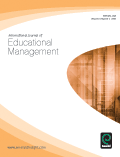 |
Managing STEM learning: A typology and four models of integration. International Journal of Educational Management, https://doi.org/10.1108/IJEM-01-2020-0035.
Abstract:
Purpose. To develop a framework for conceptualizing and managing integration in STEM learning, that can help address key issues in its research and implementation worldwide.
Design/methodology/approach. Integration in learning is a complicated but not a well-defined concept and therefore it is difficult to illustrate in theory and practice how to conceptualize, manage and implement integrated STEM learning with aims to enhance students' learning effectiveness and multiple-thinking ability. Based on a typology in integrated learning, this article re-conceptualizes integrated STEM learning into a comprehensive framework of three categories, six subcategories and four basic models. With this framework, how to manage integrated STEM learning and related issues in schools for effectiveness are discussed.
Findings. As a typology, integration in STEM learning can be classified as content integration, pedagogical integration and learner integration. They can be further differentiated as six subcategories: subject integration, domain integration, method integration, cognitive integration, SEN integration and diverse ability integration in STEM learning. Depending on the extents of content integration and pedagogical integration, four basic models of integrated learning can be identified in theory and practice. The categories, subcategories and basic models have their own characteristics, strengths and limitations. Strategies are developed to address the characteristics and related key issues of each category of STEM learning.
Research limitations/implications. The framework may help to analyze the key issues of integrated STEM learning in research and development, such as “Why and what integration in STEM learning is important and necessary in curriculum reforms for the future?”, “How the integrated STEM approach is different from the traditional subject approach?”, “How the STEM learning activities can be integrated and managed effectively for enhancing students' learning effectiveness and multiple thinking capacity?”, and “What key implications can be drawn for managing and implementing STEM learning?”
Practical implications. Based on the proposed typology and models of STEM learning, various strategies of managing STEM are discussed and developed, which will contribute to policy formulation and professional practice of integrated STEM learning locally and internationally.
Originality/value. The proposed typology and models of STEM learning and related new ideas and perspectives will contribute to future research and development in this area locally and internationally.
|
Chen, J.
 |
Development and validation of the Principal Emotion Inventory: A mixed-methods approach. Educational Management Administration & Leadership. https://journals.sagepub.com/doi/full/10.1177/1741143220919764 .
Abstract:
The current study aimed to develop and validate a Principal Emotion Inventory (PEI). Equipped with the theoretical-empirical strategy of test construction, this development and validation procedure consists of one expert survey and five sequential empirical studies with sufficient samples of participating principals based on existing emotion theories and empirical studies. The reliability, substantive validity, structural validity and external validity were tested using exploratory factor analysis, confirmative factor analysis, invariance analysis and structural equation modelling. As a result, a multidimensional model on principal emotions with 25 items was identified with a good model fit. The PEI consists of five factors: enjoyment, pride, frustration, anxiety and hopelessness. This paper is the first attempt to develop and validate a sound instrument that enables measuring school principals’ salient emotions in relation to their working experiences. The PEI would provide a validated instrument for future research on discovering the nature of principal emotions as an independent construct. Measurement is critically important to the replicability and robustness of the research. The findings on principal emotions are also informative for principal preparation and evaluation while taking emotions into consideration.
Keywords: Principal, Mixed method, Emotion, Instrument Development
|
Szeto, E.
 |
How do principals' practices reflect democratic leadership for inclusion in diverse school settings? A Hong Kong case study. Educational Management Administration & Leadership. Advance online publication. doi: 10.1177/1741143220915922.
Abstract:
Research on principals’ practice of democratic leadership for inclusion in schools has been undertaken in many parts of the world. This paper explores four principals’ leadership journeys in response to social justice issues in increasingly diverse settings within public schools, in relation to demographic and cultural changes in Hong Kong. This research aims at exploring the issues in schools arising from contextual changes in the society, contextualising characteristics of principals’ practices in relation to an emergent conception of democratic leadership practice in addressing the issues and identifying practical roles of democratic principal leadership in school transformation for diverse students’ learning development. I adopted a cross-case study of the principals’ leadership journeys through a theoretical lens of democratic leadership. The changes of demographic structure and cultural context and pressure from the central administration were the conditions of facilitating alternative practices of democratic principal leadership in a multicultural school context which evolved from the hybrid of Western and Confucian cultures in the city. These findings contribute to an international account of contextualising democratic leadership practices in a diverse Chinese school community.
Keywords: Chinese Principals, Democratic Leadership Practice, Inclusion for Social Justice, Leadership Problems, Multicultural Contexts, Uncontrollable Forces
|
Ho, C S. M.,
& Lee, H. L. D.
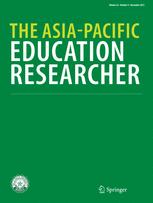 |
School banding effects on student financial literacy acquisition in a standardised financial literacy curriculum. The Asia-Pacific Education Researcher. https://doi.org/10.1007/s40299-019-00491-z.
Abstract:
A standardised financial literacy curriculum ensures that all students in a school system receive financial knowledge, which offers them the necessary support to make informed decisions about money management and practise appropriate financial behaviour. In Hong Kong, all secondary schools supposed to teach financial literacy via a standardised curriculum. This study attempts to examine how this standardised financial literacy curriculum variably impacts students whose performance in academic-based examinations differ. We use an extended framework based on extensions of Hargreaves and Fullan (Professional capital: transforming teaching in every school. Teachers College Press, New York, 2012) theory of professional capital (human, social, decisional and emotional capital; Lee and Chiu 2017) to analyse the influence of school banding (academic differentiation by school) on student financial literacy. We surveyed 1306 students from 20 secondary schools. Structural equation modelling analysis demonstrated that exposure to the curriculum had only a weak positive effect on students’ financial literacy, and only for those from ‘band 3’ schools, which typically enrol students with the weakest academic performance. Based on examination of the results, we draw conclusions as to how students’ professional capital is differentiated by school banding.
|
Zhoc, K. C. H., Chung, T. S. H., King, R. B.,
& Chen, J.
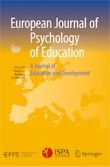 |
Emotionally intelligent students are more engaged and successful: Examining the role of emotional intelligence in higher education. The European Journal of Psychology of Education. https://doi.org/10.1007/s10212-019-00458-0 .
Abstract:
The role of emotions in student engagement has been examined in many studies. However, little is known about how emotional intelligence (EI) is related to engagement and other keylearning outcomes in higher education. To fill this gap, this study examined how EI isassociated with student engagement and how EI and engagement jointly predict key learningoutcomes in higher education, including the students’GPA, generic outcomes, and satisfac-tion with the university experience. The study adopted a prospective longitudinal designinvolving 560 first-year students from 10 faculties of a university in Hong Kong. The data were collected at two-time points, namely before the start and after the end of the students’first year in the university. Structural equation modeling was employed to test the measurement and hypothesized models. Results indicated that EI positively predicted all dimensionsof student engagement and promoted key learning outcomes (including GPA, generic learning outcomes, and students' satisfaction with the university) via the different dimensions of student engagement. The model also explained 16%, 44%, and 38% of the students' GPA, generic learning outcomes, and satisfaction with their university experience, respectively. This study provides empirical evidence on the positive effect of EI on the students’optimal functioning in the higher education context. Implications of the findings are discussed.
Keywords: Emotional Intelligence, Student Engagement, Academic Performance, Student Success, Higher Education, Generic Outcomes
|
Liu, C., Cheung S.K., Chung, K. K. H., McBride, C., Lam, C. B., & Li, X.
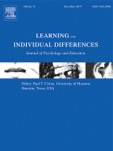
|
The roles of executive functioning and oral language skills in young Chinese children's arithmetic competence. Learning and Individual Differences, 77:101810. https://doi.org/10.1016/j.lindif.2019.101810 .
Abstract:
This study investigated the relative contributions of executive functioning (EF) and oral language skills to performance on number-fact and story problems in Chinese children. A total of 280 kindergarten children in Hong Kong participated in this study. Children were assessed on their EF, phonological awareness, morphological awareness, receptive vocabulary, performance on number-fact and story problems. Results of path analysis showed that when children's age and parental education were controlled, children's EF, phonological awareness, and morphological awareness were correlates of performance on both number-fact and story problems, whereas receptive vocabulary was not. After further controlling for performance on number-fact problems, morphological awareness was the only variable under investigation that linked to performance on story problems. These findings underscore the importance of taking the development of EF and oral language skills into consideration when guiding children's arithmetic learning.
|
Bryant, D. A.,
Wong. Y. L.,
& Adames, A.
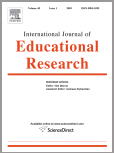
|
How middle leaders support in-service teachers’ on-site professional learning. International Journal of Educational Research. 100: 105130. https://doi.org/10.1016/j.ijer.2019.101530 .
Abstract:
Research has demonstrated that the professional development of staff is prioritised by effective school leaders. A limited, but growing research base has noted the potential influence of middle leaders, i.e., teachers with formal leadership responsibilities, to build teachers’ professional capacity. This paper examines middle leaders’ development of others’ professional and leadership capacities. It uses a mixed methods approach, analysing qualitative interview and social network data. While the qualitative data distils several key themes, the social network analyses sheds light on the interactions that support teachers’ development. The findings examine how middle leaders facilitate teacher empowerment and team building by (a) mediating instructional initiatives, (b) devising structures for curriculum enactment, and (c) creating opportunities for professional dialogue.
Keywords: Middle Leadership; Distributed Leadership; Teacher Learning; Professional Development; Social Network
|
鞠玉翠;
張萌.
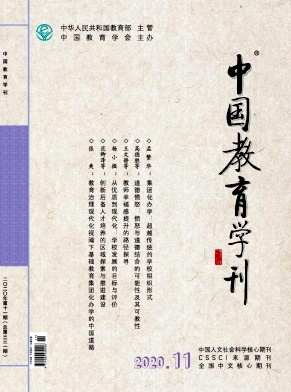
|
學校現代化評價的“公平”之維. 中國教育學刊, 11: 26-31.
|
Lee, M., Ryoo, J. H., Walker, A. (in press).
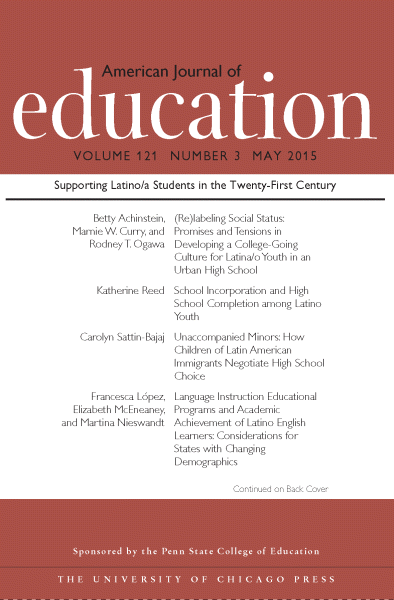
|
School principals’ time use for interaction with individual students Macro contexts, organizational conditions, and student outcomes. American Journal of Education.
|
Lee, M., Kim, J. W., Walker, A., Bryant, D. A., & Mo, Y.
(in press).
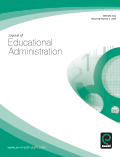
|
Development, validation and application of Professional Learning Community (PLC) instruments. Journal of Educational Administration.
|
Qian, H. Y., & Walker, A.
(in press).

|
Building emotional principal-teacher relationships in Chinese schools reflecting on paternalistic leadership. The Asia-Pacific Education Researcher.
|
Chen, J.,
& Walker. A. (accepted)

|
Emotional trajectory at different career stages of principalship: A perspective from excellent principals. Educational Management Administration & Leadership.
|
So, W. M. W., Cheng, N. Y.,
Lee, T. H.,
& Li, W. C. (accepted).

|
Teachers’ professional development with peer coaching to support students with intellectual disabilities in STEM Learning. Education Technology & Society (Special Issue: Teacher Professional Development in STEM Education).
|
Ho, C. S. M.,
Lu, J., &
Bryant, D. A. (accepted).

|
Understanding teacher entrepreneurial behavior in schools: Conceptualization and empirical investigation. Journal of Educational Change.
|
Cheng, T. J.,
Chen, J.,
& Bryant, D. A. (accepted).

|
Teacher leaders’ emotions mirror teacher professionalism via collegial trust. The Asia-Pacific Education Researcher.
|
Yang, X.,
Hua, RE.,
Zheng, M. (in press).

|
The Shanghai model: An innovative approach to promote teacher professional development through teaching-research system. Educational Philosophy and Theory.
Abstract:
Chinese students’ outstanding performance in several rounds of PISA tests has attracted extensive attention on Chinese teacher professional development practices and system. The school-based teaching research system has evolved for many years in China and became a mature and systematical model for improving teaching quality. However, this system and its functions has not been fully recognized and understood. This case study, mainly focusing on Shanghai, explores how the teaching-research system formed and developed and how it influenced teachers’ learning and professional development. We summarized three different versions of Shanghai’ teaching-research models and deeply described their processes, characteristics, and influence. Future research directions and implication for creating an effective and sustained approach for improving teacher quality were also discussed.
|
| Qian, H- Y., & Wang, X. (in press). |
促進教育改革和科學決策:大學在U-S合作中的角色調試 [Promoting educational reform and scientific decision-making: The mediating role of universities in university-school collaboration]. Shanghai Education.
|
張萌;
金哲;
胡雅靜.
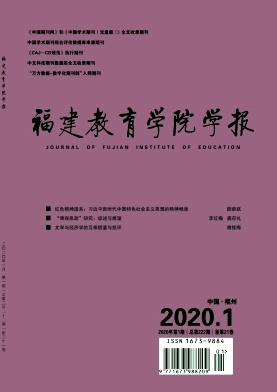
|
關於教師公平對待和學生公平體驗的現狀研究——基於東中西部18所中小學的調查. 《 福建教育學院學報 》, 1: 28-35.
|